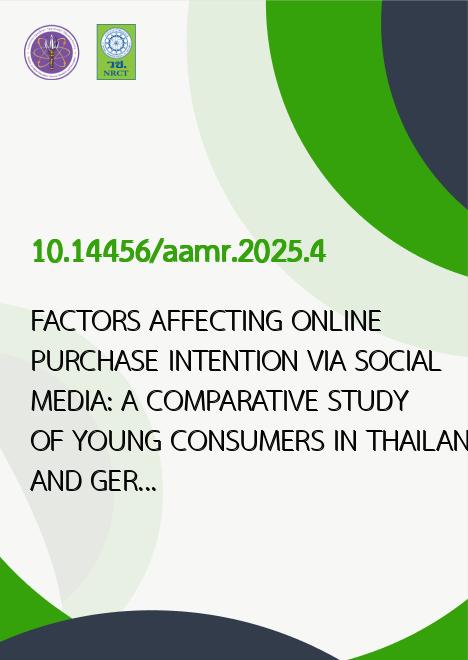
|
FACTORS AFFECTING ONLINE PURCHASE INTENTION VIA SOCIAL MEDIA: A COMPARATIVE STUDY OF YOUNG CONSUMERS IN THAILAND AND GERMANY |
|---|---|
| รหัสดีโอไอ | |
| Creator | Daniel SCHÜLER |
| Title | FACTORS AFFECTING ONLINE PURCHASE INTENTION VIA SOCIAL MEDIA: A COMPARATIVE STUDY OF YOUNG CONSUMERS IN THAILAND AND GERMANY |
| Contributor | Nirundon TAPACHAI |
| Publisher | Asian Administration and Management Review |
| Publication Year | 2568 |
| Journal Title | Asian Administration and Management Review |
| Journal Vol. | 8 |
| Journal No. | 1 |
| Page no. | Article 4 |
| Keyword | Consumer Behavior, Online Purchase Intention, Young Consumers, Structural Equation Modeling |
| URL Website | https://so01.tci-thaijo.org/index.php/AAMR |
| Website title | https://so01.tci-thaijo.org/index.php/AAMR/article/view/276142 |
| ISSN | 2730-3683 |
| Abstract | Social media plays an important role in the future of online marketing and e-commerce. Social media advertisement has become a very efficient way of promoting goods online. Due to the increasing number of social media platforms and online users, the potential of e-commerce is constantly expanding. A particularly important target group for marketers is the so-called Generations Y and Z. It is one of the main goals for businesses to attract people from this demographic group and get them to purchase offered products or services. The lack of research on social media purchasing behavior comparing Southeast Asia and Europe is a central goal and a motivation for this research to create new knowledge. The following article’s objectives are to draw a comparison between Thai and German social media users from Generation Y and Z and determine factors that influence their purchase intention while shopping through online social media platforms. Data was collected through a structured, quantitative survey questionnaire. A sample of 400 persons was drawn using convenience sampling. SPSS 22 statistics and structural equation modeling through SPSS AMOS 22 were used to analyze the data. The results indicated that attitudes positively influence purchase intention, with a β-Value of 0.501 in Thailand or 0.64 in Germany. At the same time, the Subjective Norm did not fit in the 95% confidence interval in the t-test and was therefore considered to be not significant. This implies that in both countries, young consumers focus on factors like personal beliefs and lifestyle, which corporations operating in the country can use to enhance potential clients' purchase intention. |
